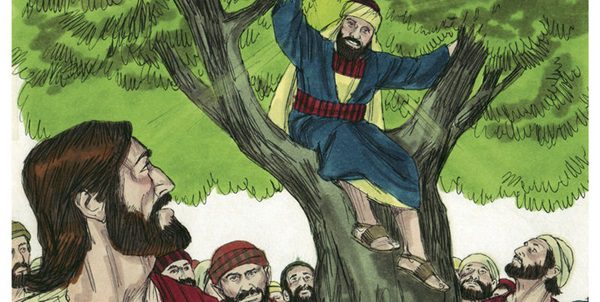 Churches throughout the world that follow the Revised Common Lectionary will be discussing the story of Zacchaeus this Sunday. The story is found in Luke 19:1-10.
Churches throughout the world that follow the Revised Common Lectionary will be discussing the story of Zacchaeus this Sunday. The story is found in Luke 19:1-10.
Jesus was walking through a town named Jericho. Zacchaeus lived there. He was a rich man, who happened to be the chief tax collector in Jericho. Many people thought that tax collectors became rich because they took more taxes than Rome required, thus keeping the extra money for themselves.
People resented tax collectors, especially chief tax collectors. They were viewed as traitors because the collected taxes for the Roman empire. Of course, people resented rich tax collectors because deep down they wanted to be rich, like a tax collector.
As Jesus walked through Jericho, a crowd formed around Jesus. Zacchaeus wanted to see Jesus, but he couldn’t see Jesus because “he was short in stature.” We’ve always been taught that “he” refers to Zacchaeus, but if you look at the sentence structure, it’s hard to tell. Was Zacchaeus short? Or was Jesus short? The story is ambiguous.
Whomever was short, Zacchaeus decides to climb a Sycamore tree to see Jesus. The crowd blocked Zacchaeus from seeing Jesus. What blocks you from getting a better vision of God? How might you creatively move beyond those obstacles to get a better view?
When Jesus saw Zacchaeus up in the tree, he said to him, “Zacchaeus, hurry and come down; for I must stay at your house today.” Why did Jesus want to stay at Zacchaeus’s house? We don’t know for sure, but Jesus was always wanting to spend time with those who were cultural outsiders. He sought out the scapegoats of his culture and invited them into a loving community.
The Truth about Crowds and Zacchaeus
But there are dangers when we seek to love those who are marginalized. The crowd, which had already turned against Zacchaeus, now turned against Jesus, too. The crowd grumbled and said, “He has gone to be the guest of one who is a sinner.” This crowd was not particularly evil; it was just following crowd behavior. We humans tend to know that we are good by identifying someone else who is bad. If we can crowd together with others and unite against a common enemy, then that bolsters our sense of being good over and against a common enemy.
Zacchaeus then defends himself. What he says has been translated in different ways. Usually it’s translated incorrectly as, “Look, half of my possessions, Lord, I will give to the poor; and if I have defrauded anyone of anything, I will pay back four times as much.” This translation makes the story about repentance. The crowd was right about Zacchaeus. He really was a bad man who stole from them. Once he saw Jesus, Zacchaeus repented and became a good man. Thus, Jesus says, “Today salvation has come to this house, because he too is a son of Abraham.”
But the correct translation is different. Zacchaeus actually says, “Look, half of my possessions, Lord I give to the poor; and if I defraud anyone of anything, I pay back four times as much.” With this translation, Zacchaeus says that the crowd is wrong about him. Zacchaeus hasn’t cheated anyone. He already gives to the poor, and if he accidentally defrauds anyone, he already pays them back four times as much.
Here, Zacchaeus refuses to believe the crowd’s story about him. He knows he is worthy of being loved and accepted by the crowd, if only they could see the truth about him. So, when Jesus says, “Today salvation has come to this house,” he’s not so much talking about Zacchaus’s house. He’s talking about the house of Israel, that has witnessed to the fact that even Zacchaeus, the one they hated and scapegoated, also belongs in the family of Abraham.
Regardless of the translation, Jesus doesn’t go up to Zacchaeus and say, “First, you must repent of your sins, and then I will stay at your house and show you the love of God.” Instead, Jesus simply shows Zacchaeus’s God’s love. That’s the point of this story. When it comes to God’s love, it doesn’t matter what we have done, or what we have left undone. Nor does it matter what the crowd says about us. God just loves us.
With your family
After reading the passage, you might discuss with your family ways in which you have been different characters in this story. Have you ever been Zacchaeus? Have you ever been on the outside of a group, never quite feeling like you fit in? Of course. We all have felt like that. How did you feel about it? Have you ever been in the crowd? Have you ever desperately wanted to be part of a group that you created a group identity against a scapegoat? Of course. We all have done that. What was that like for you? And finally, have you ever been like Jesus? Have you ever sought out someone who was scapegoated by the larger group? What was that like for you? What are the risks of doing that?
Image:
Distant Shores Media/Sweet Publishing [CC BY-SA 3.0 (http://creativecommons.org/licenses/by-sa/3.0)], via Wikimedia Commons














